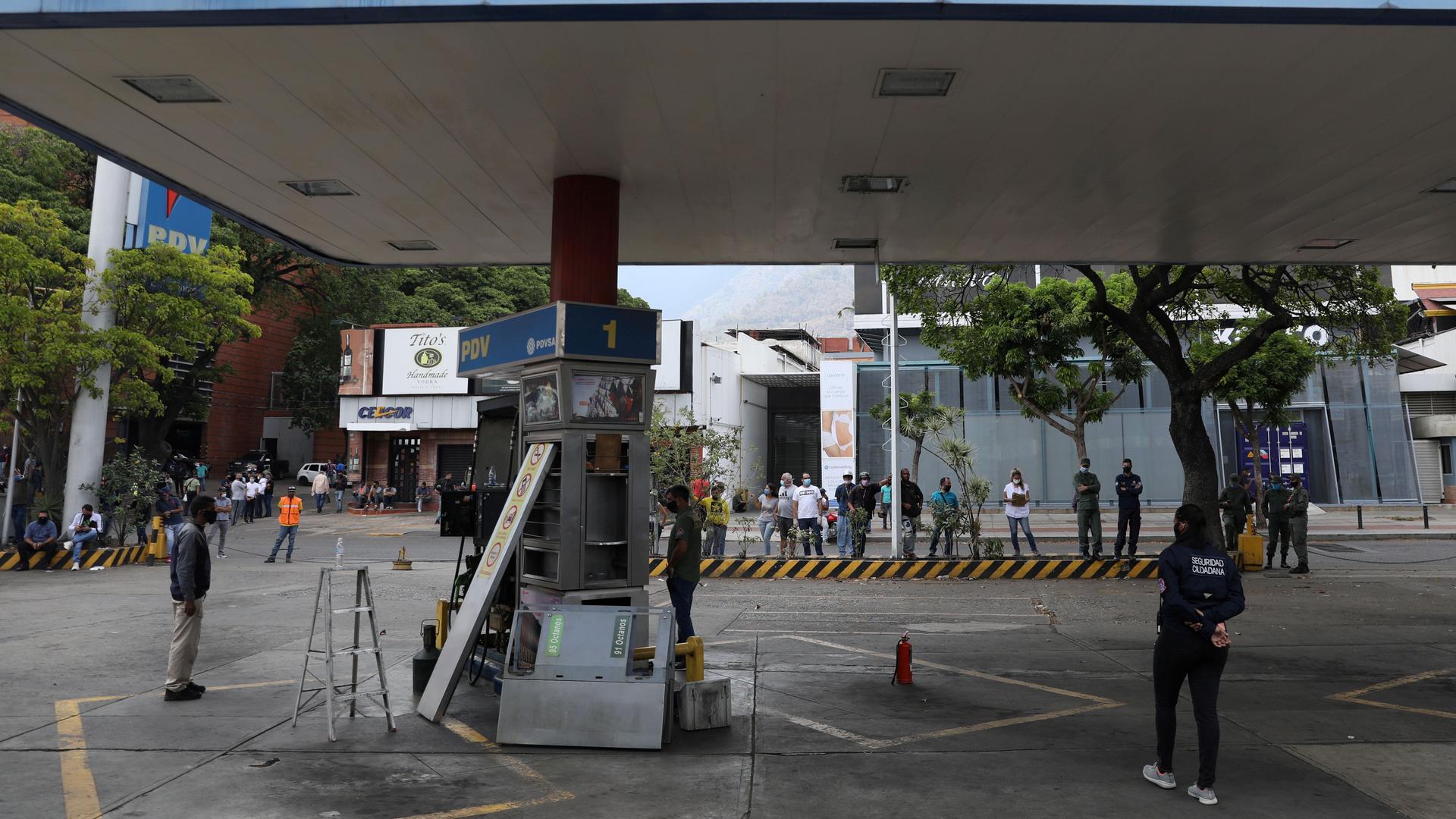When Dr. Arturo Martínez woke up in his Honda Civic, his car was a mess. It looked like a small apartment — full of pillows, blankets, cutlery and Tupperware with the leftovers of yesterday’s dinner.
“We prepared ourselves to spend the night here to be able to refuel. We brought some food and pillows to be a little bit more comfortable while waiting,” Martínez said.
Martínez was one of the hundreds of motorists waiting for gasoline in a miles-long line at a station in eastern Caracas. He arrived at 2 a.m., but five hours later, he wasn’t even close to reaching the pumps.
Related: As the coronavirus drags on, Mexico’s food prices soar
This is an unusual scene for Caracas’ residents. Lines to buy fuel have been common in parts of Venezuela for years. But, in recent weeks, the problem has arrived in the capital where drivers are now waiting hours to fill their tanks.
Every day before dawn in Caracas, essential workers, like doctors, line up for hours at the few gas stations that still have fuel. The OPEC nation with the world’s largest oil reserves is short on gas because its refineries have collapsed, and the country can’t import fuel due to US sanctions.
Martínez feels frustrated, he says — the shortages are limiting his ability to function as a doctor. His car is the only way he can get to work due to a lack of public transportation.
“There will come a time when there will be such great discomfort that doctors will say, ‘I am not going to work. I am not going because I have to suffer to get gasoline, and I am exposing myself to the virus while being in line.’”
“There will come a time when there will be such great discomfort that doctors will say, ‘I am not going to work. I am not going because I have to suffer to get gasoline, and I am exposing myself to the virus while being in line,’” he said.
Related: Bolsonaro’s ‘so what’ response to coronavirus deaths is the latest in his spiraling political crisis
Further back in line, Dr. Alejandro Rodriguez is also waiting for gas.
“I arrived at 5 a.m. It’s 9 a.m.,” Rodriguez said. “I should be in the hospital right now. Fortunately, what we do as colleagues is that we cover somebody’s shift when that person is queuing for gas. This is what we do, but it shouldn’t be like that.”
The government has promised that doctors and hospital workers will have preferential access to fuel stations. But Rodriguez has found the solution to be less than useful.
“I’ve had to line up within a special queue for doctors, but it’s still a line. They are daylong lines, practically. I don’t know if ambulances get preference, but my car doesn’t.”
“I’ve had to line up within a special queue for doctors, but it’s still a line. They are daylong lines, practically. I don’t know if ambulances get preference, but my car doesn’t,” he said.
Some fuel stations in Caracas were shut down in recent days, as authorities try to ensure the effective fulfillment of a nationwide quarantine and contain the spread of the coronavirus. The measure also aims to ration the country’s dwindling gasoline inventories.
Related: Chile’s ‘COVID-19 card’ sparks controversy over ‘uncertainty of evidence’ about immunity
According to fuel stations workers in Caracas, authorities are rationing gasoline by limiting drivers to five gallons for small cars and 10 gallons for trucks, vans and ambulances.
Increasing petrol shortages is making Venezuelans’ lives tougher. When the pandemic struck, Venezuela was already suffering from hyperinflation and a battered health system. Critics of President Nicolás Maduro blame the collapse on government corruption and mismanagement. The government blames US sanctions.
In Venezuela, filling a tank is basically free. Thanks to government subsidies, a full tank could cost less than a penny. But, out of desperation, some people, like Jesus Peña, who sells chicken at an open-air market, are now turning to the expensive black market for fuel.
Peña pays between $1 and $2 per liter. But, few people can afford those prices in a country where the minimum wage is less than $5 per month.
Venezuela has less than 500 reported cases of the coronavirus. The country imposed a nationwide lockdown in March when just a few cases were detected. Since then, Peña hasn’t been able to fill his tank at a station due to long lines.
“Yesterday, my neighbor sold me 20 liters that he took out of his car. I paid $20 for it. This problem is going to get worse. I have more than one colleague who is not delivering anymore because they ran out of gasoline.”
“Yesterday, my neighbor sold me 20 liters that he took out of his car. I paid $20 for it. This problem is going to get worse. I have more than one colleague who is not delivering anymore because they ran out of gasoline,” Peña said.
Related: Advocates raise alarm as countries fail to collect racial data of coronavirus patients
The fuel shortages are already harming food production and delivery. Producers are not being able to get their goods to markets, and farmers are being forced to let crops rot in fields.
Even though Peña desperately needs the gas to keep his business going, he doesn’t know how much longer he can keep paying the high prices.
“I have gasoline for this week, I don’t know what will happen the next one. It’s worrying. I’m really worried,” he said.
Back at the gas station, as the line advances, some drivers, like Martínez, push their cars rather than turning on the ignition. Anything to save just a little extra gas.
